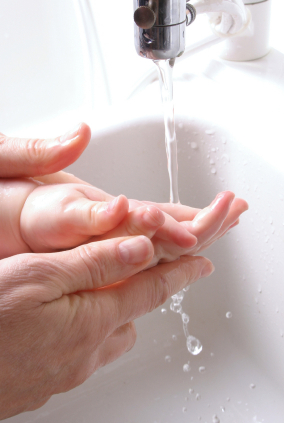If you would like to improve the quality of your household water supply, a water filter or purifier is the appliance to have. Even though most municipal water systems produce the safest water in the world, the water still contains some contaminants. Anyone who wants to realize the full health benefits of clean and fresh water should install a residential water filter purifier.

A wide variety of contaminants may be present in drinking water.
Buy Water Purifier Filters Today On Amazon.com
- Microbial Pathogens
Pathogens can create serious health risks in drinking water. They are micro-organisms that include bacteria, parasites (cryptosporidium) and viruses. Pathogens can produce diseases such as salmonella, hepatitis, shigellosis, dysentery and gastroenteritis. Their presence in drinking water indicates that the system is contaminated by sewage or animal waste. - Volatile Organic Contaminants (VOCs)
Water can occasionally contain toxic chemicals, and only a few are regulated. These include trihalomethanes, pesticides, insecticides, benzene and trichloroethylene. Potential health effects are cancer, liver and kidney damage, birth defects and central nervous system disorders. - Inorganics
Inorganic contaminants include lead, arsenic and fluoride. These metals can infiltrate a water system from industrial processes, natural sources and possibly from the materials used in a household plumbing system. Their presence can cause cancer and poisoning. - Radioactive Elements
Radon is radioactivity that comes from the decay of uranium in rocks and soil. Typically, it occurs more often as a soil gas than from a presence in drinking water.
Water filters and purifiers come in several different types and a wide range of costs. Generally, the filters are either point-of-use or point-of-entry. Choosing the correct model and type depends on what kind of contaminants and bacteria needs to be removed. It is important to determine the quality of water that needs filtering and the contaminants that need to be removed in order to select the correct type of filter.
Activated charcoal and carbon filters
The most common water filter uses activated charcoal or carbon. They come as pitchers, faucet-mounted, undersink and whole house (point-of-entry). The carbon, which is a porous material, absorbs the impurities as the water passes through the filter. Carbon filters can remove PCBs, lead, chloramines, some parasites and certain bacteria. They are very effective at removing bad odors and taste.
Carbon filters are very cost effective for general household use, easy to install and have a long filter life. However, they are not efficient at removing toxic heavy metals, nitrates, inorganic chemicals or micro-organisms.
Reverse osmosis systems
A reverse osmosis filter has a filtering membrane with a very fine pore structure and can remove a wide range of contaminants. They can remove sulfates, chlorides, fluoride, heavy metals and pharmaceuticals. A carbon filter is usually installed in conjunction with a reverse osmosis filter.
Water passes under pressure through a semi-permeable filter and then to a storage tank. A pump is necessary to provide adequate water pressure at the outlet. The disadvantage of a reverse osmosis filter is that it wastes two to five gallons of water for each gallon of clean water that is produced.
Ultraviolet light
Ultraviolet light kills bacterial micro-organisms, such as cryptosporidium, by disinfecting the water with mercury low pressure lamps. For more complete filtration, they are usually combined with a carbon filter that removes other contaminants. Ultraviolet filters do not remove chemicals or metals.
Ion exchange
The ion exchange process is used primarily for water softening to remove calcium and magnesium. Ion exchange filters pass water through bead-like spherical resin materials that exchange sodium ions for the calcium and magnesium ions. They do not remove micro-organisms, particles or bacteria.
After reviewing an analysis of your own water quality, you can make a decision on which type of water purifier filter would be appropriate for your household and budget.
